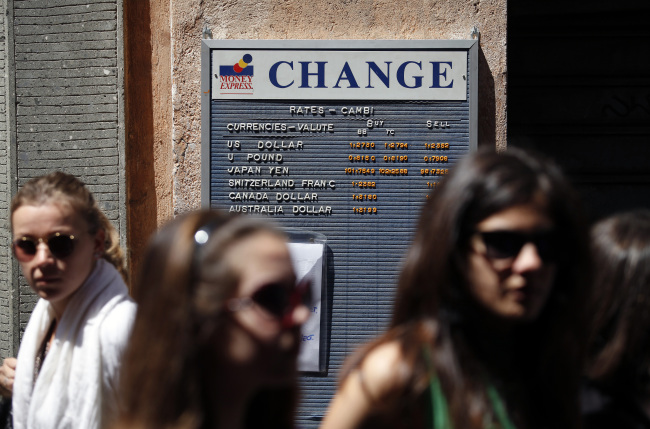Global regulators may start overseeing currency rates in a widening response to benchmark-rate setting scandals that began with revelations on the manipulation of Libor, according to two people familiar with the matter.
The International Organization of Securities Commissions, a Madrid-based group known as Iosco that harmonizes market rules, may propose final guidelines improving transparency and oversight of benchmarks, including the WM/Reuters rates, as soon as next month, said the people, who asked not to be named because the talks aren’t finalized.
The U.K. Financial Conduct Authority, which oversees markets and prosecutes financial crime, is looking into potential manipulation in the $4.7 trillion-a-day foreign-exchange market after being contacted by a whistle-blower in March. The regulator has sent requests for information to four banks, including Deutsche Bank AG and Citigroup Inc., according to one of the people.
“All benchmarks share similar vulnerabilities so there is a need for a framework that applies to all benchmarks to ensure their integrity and restore market confidence,” Chantal Hughes, a spokeswoman for European Union Financial Services Commissioner Michel Barnier, said in an emailed statement. “We will also be making a proposal this summer on the framework for benchmarks.”
 |
Pedestrians pass a board displaying foreign exchange rates in Rome. (Bloomberg) |
The FCA “will review” Iosco’s recommendations and decide which rates to oversee, spokesman Chris Hamilton said.
Martin Wheatley, the regulator’s chief executive officer, has already taken on oversight of the London interbank offered rate after his review of how the rate is set.
Sebastian Howell, a spokesman for Deutsche Bank, and Jeffrey French, a spokesman for Citigroup, declined to comment on the FCA requests.
Losco proposed in January that rates used in “currency markets, which can be represented by specific or aggregate benchmarks,” be subject to regular audits, stricter oversight from regulators and a code of conduct for submitters.
The WM/Reuters rate would be included under this definition, one of the people said.
The currency market, the biggest in the financial system, is one of the least regulated as it takes place away from exchanges. Traders colluded with counterparts at other firms to boost chances of moving the WM/Reuters rates, according two people with knowledge of the manipulation.
The data are collected and distributed by World Markets Co., a unit of Boston-based State Street Corp. and Thomson Reuters Corp. Bloomberg LP, the parent company of Bloomberg News, competes with New York-based Thomson Reuters in providing news and information, as well as currency-trading systems and pricing data.
Bloomberg LP also distributes the WM/Reuters rates on Bloomberg terminals.
“The process for capturing this information and calculating the spot fixings is automated and anonymous, and the rates are monitored for quality and accuracy,” State Street said in an emailed statement.
The data are derived from “multiple execution venues through a streaming rather than solicitation process,” the company said.
Spot foreign-exchange transactions aren’t considered financial instruments in the same way as stocks and bonds. They fall outside the EU’s Markets in Financial Instruments Directive, which requires dealers to take all reasonable steps to ensure the best possible results for their clients.
Britain should investigate the manipulation of currency rates, European Union officials said after Bloomberg News revealed that traders have been rigging foreign-exchange benchmarks for more than a decade.
“They need to get to the bottom of it,” Sharon Bowles, 60, chairwoman of the European Parliament’s economic and monetary affairs committee and a member of the U.K. Liberal Democrat party, said in an interview. “It’s quite upsetting we have got another bad-news story. It’s time we managed to restore the reputation of our banks.”
Tensions between Britain and its EU partners about oversight of the financial industry have intensified after three banks were fined about $2.5 billion for rigging Libor.
The European Commission is considering whether to move oversight of Libor away from the U.K. to a Paris-based EU watchdog.
(Bloomberg)




![[Weekender] Korea's traditional sauce culture gains global recognition](http://res.heraldm.com/phpwas/restmb_idxmake.php?idx=644&simg=/content/image/2024/11/21/20241121050153_0.jpg)



